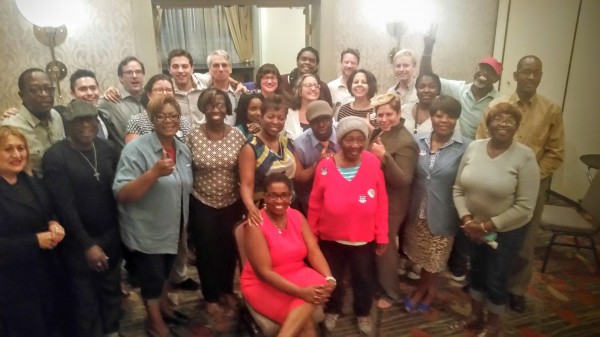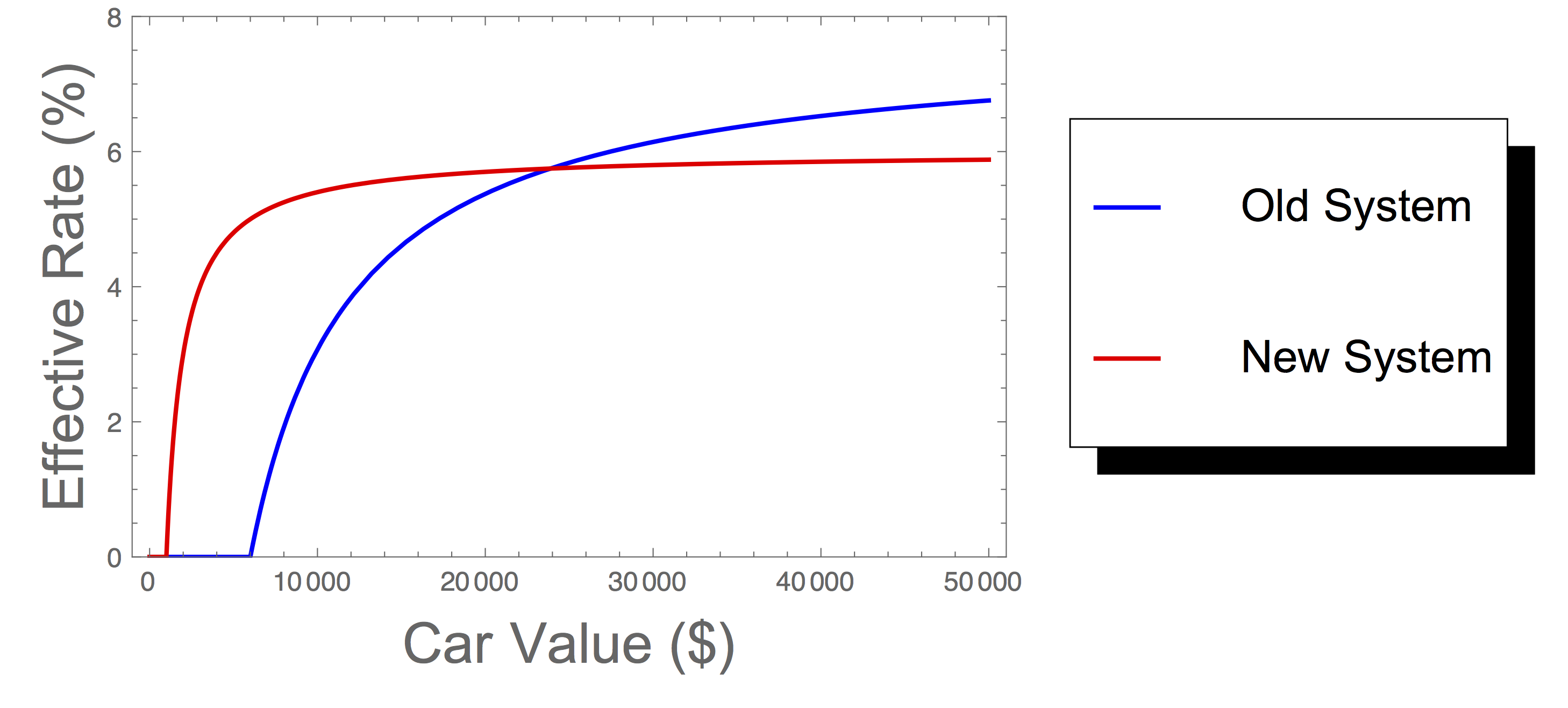
How does it feel to unseat Walaska?
If I were to sum up everything, it would be that I am proud of the work that Jeanine did—especially the fact that she was willing to put herself out there and dedicate her time and energy to a new lifestyle. She was very persistent with the work that I gave her, and I am very proud of the result.
What was your strategy?
The most important aspect of Jeanine’s campaign was being approachable and personable. We wanted to create a community of discussion around issues that were important to the constituents. Canvassing enabled us to develop relationships, and earn support.
What inspired you to get involved in politics?
I read Bernie’s platform, and I pretty much immediately decided that if I did not put all of my effort into electing this man, then I would be extremely disappointed in myself. I had never had any interest in politics before, but Bernie changed everything for me.
That’s interesting. Most people discover Bernie through watching him online, but you discovered him by reading his platform. That’s very issues focused.
I am 100% issues oriented. My main focus is always on enacting progressive policy to make peoples’ lives better.
So what did you do for Bernie?
How long do we have? I started by attending local events, was invited to help get out the vote in New Hampshire. I then decided to spend all my money on plane tickets to fly around the country to volunteer for Bernie. Everywhere I went, I wanted to make sure that I was bringing something new and helpful to that state. I did not want show up one day, eat the snacks, and talk to the organizers for fifteen minutes about why Bernie’s great. I wanted to make the biggest possible impact for Bernie that I could.
So what’s an example of something new that you brought to a state?
In New York, no one was touching two congressional districts in upstate New York, and I created a campaign hub for the area, and I opened three additional staging locations.
How did Bernie do in your area?
Oh, he won overwhelmingly, even though it was a very Republican area. It was so Republican that I met a woman who said she had to register as a Republican in order to even be considered for a job!
How many states total did you travel to to volunteer in?
Seven. Rhode Island, New Hampshire, Nevada, Texas, Missouri, New York, and California.
Wow, that’s a lot!
Yeah, I wish I could have done more.
What inspired you to run Jeanine’s campaign?
We had been working together to elect Bernie Sanders for months. She called me one day. I was actually in California. She told me she was running for office, and she really wanted me to be her campaign manager. I was overwhelmed with the fact that someone would actually want me to manager their campaign. I was scared. I was definitely scared.
What made you decide to do it?
I was planning on working on Zephyr Teachout’s congressional campaign, but I knew that I could make a bigger impact by working for Jeanine.
So what were the biggest challenges you faced on the campaign?
The most difficult thing for this campaign was convincing everyone else that she had a shot.
A lot of people assumed that Walaska was going to win. How did you manage to pull off your upset victory?
Having a really dedicated team was the key. We had some amazing volunteers, especially our intern Enzo Cuseo. Jeanine’s husband, Dan, also put in long hours for the campaign after his normal work day. We utilized every moment of Jeanine’s time and our own time to knock on doors, hold events, and make phone calls. Long days and late nights were just part of the job.
What’s the most important result of this race?
To be honest, I think it is showing that your strategy and efficiency can go a long way. People just assume that the person with the most money is going to win, but if you run a strategic and efficient campaign, you can pull it off despite the monetary challenges. Also, I think that Jeanine will be an inspiration to future progressive candidates.
So where are you going next?
I want to continue electing progressive candidates. The Revolution waits for nobody.
]]> There are those who want to give credit for what we accomplished in the September primary to some vague anti-incumbent sentiment, or even tolls. I’m writing this piece to dispel that notion. Progressives won big on Tuesday for two reasons: hard work and Rhode Islanders’ commitment to progressive change.
There are those who want to give credit for what we accomplished in the September primary to some vague anti-incumbent sentiment, or even tolls. I’m writing this piece to dispel that notion. Progressives won big on Tuesday for two reasons: hard work and Rhode Islanders’ commitment to progressive change.
This victory truly belongs to the women and men who made it happen. Those people include the candidates, but they also include the people who did work behind the scenes, people who never get nearly enough credit. People like Laufton Ascencao-Longo, Kavelle Christie, Grizzel Clemetson, Craig O’Connor, Georgia Hollister-Isman, Abby Godino, Andy Cagen, Judith Finn, Duncan Weinstein, Nate Carpenter, Johanna Harris, and the whole Ranglin-Vassell family.
Laufton Ascencao-Longo, a native Rhode Islander and the son of a Portuguese immigrant who moved from Madeira to Fox Point, he had gone away to Pittsburgh to attend college. There, he became a leader in the Progress Pittsburgh movement, the wildly successful campaign to take back Pittsburgh that progressive activists around the country dream of emulating. He also worked on President Obama’s campaign, Tom Wolf’s successful campaign for Governor of Pennsylvania, a winning state senate race in Virginia, and a host of other smaller races. Laufton had spent half a decade working hard to win races and create change, and in his own words, he “was done.”
He moved back to Rhode Island to “retire.” He was done with working 15 hours a day, seven days a week. He was done with sleeping on couches he didn’t even own. He was done. To Laufton, Rhode Island was the place where he could kick back and become a bystander again. Thanks in no small part to me, he got dragged back in.
We would meet for the first time in late December when he walked into a Progressive Democrats meeting to drop off Sanders swag he had gathered while in Virginia.
I wanted a political revolution. I’ve long believed that the people of this state have been betrayed by a corrupt, conservative political machine. A machine that is only interested in pursuing the interests of corporations, insiders, and right-wing groups. The machine is allowed to continue to function because it’s never challenged, and earlier this year, I reached my breaking point. People told me I was being “unrealistic,” that change would only come if we played along with the machine. I never agreed, and I refused to give up. I wanted a slate of primary challengers to rise up and give Rhode Island a choice.
But we needed candidates, we needed workers, and we needed money. I knew I couldn’t do it alone.
For far too long, the Rhode Island progressive movement has lacked professional campaign know-how. Sure, I knew all about the kind of campaigns local progressives have always run. I knew loosely what a mail program should look like, and I knew knocking on doors was far and away the most important thing. But when it came to the modern cutting-edge tactics that came largely out of the Obama campaign, I was clueless. And I knew it. That’s why Laufton was exactly what we needed. I wanted him on board, so I bullied him into agreeing to meet with some of the prospects we had who would be running for office.
 The first introduction was with Moira Walsh. Moira was one of the earliest to decide to run for office, and she was exactly what we needed to get Laufton hooked. She had grown up in Smith Hill and had spent the previous year fighting for an increase in the tipped minimum wage. She knew the conservative political machine wasn’t fighting for her neighborhood because she had seen what happens at the State House. She knew something had to be done. So she decided to run. Moira impressed Laufton (and me) with her honesty, her passion, and her unbelievable work ethic. Not fully onboard yet, Laufton agreed to help her once a week.
The first introduction was with Moira Walsh. Moira was one of the earliest to decide to run for office, and she was exactly what we needed to get Laufton hooked. She had grown up in Smith Hill and had spent the previous year fighting for an increase in the tipped minimum wage. She knew the conservative political machine wasn’t fighting for her neighborhood because she had seen what happens at the State House. She knew something had to be done. So she decided to run. Moira impressed Laufton (and me) with her honesty, her passion, and her unbelievable work ethic. Not fully onboard yet, Laufton agreed to help her once a week.
Both loud and openly dismissive of those who were in charge, Laufton and Moira were a perfect match. Within a week, Laufton had gone from helping on occasion to sitting down with Moira nightly. I was giving them fundraising and volunteer prospects and they were fundraising and recruiting for a few hours every night. Two weeks in, Laufton sat down and drafted a campaign plan, not five pages (as we usually see in Rhode Island) but 28 pages, not counting the appendix. He broke down every piece of the district and examined every single street, mapping out a strategy of what Moira would have to do every week to win. Moira was more than happy to do all of it. She wanted to win poured everything into making it happen.
The plan was working. It was just the first step in the revolution but it was one hell of a step. In just a few months, we had gone from monthly meetings to a well oiled operation ready to score some major upsets.
In early March, while the General Assembly was busy enacting conservative policies, Moira was out knocking doors. Even given her close ties to her district, Moira blew us away with how hard she worked. Usually, campaigns keep track of how many times the candidate has walked the district. Sometimes that number is as low as one or two. With Moira, we quickly lost count. Laufton was at her side every step of the way.
I went back to work on recruiting candidates. I met with people at bars and coffee shops. I worked hard to persuade candidates to make the jump and join a race. I told them that if they wanted to continue on the fight Bernie had started this was the way to do it. By May, our two candidates had grown to more than ten. Every one of them was working hard to make change. Our revolution was becoming a reality.
Bernie’s surprise Rhode Island win gave us a huge boost of confidence. I couldn’t have been more excited about Bernie. In 2008, Hillary Clinton became the first politician I ever voted for. But the man who broke the corrupt, conservative machine that once ran Burlington through its death grip on the Democratic Party has always been my political hero. What he achieved in a town without primaries was the original political revolution. Bernie’s Vermont story inspired me long before he decided to run for president, so I did everything I could to help him win Rhode Island. (The real work, though, was done by the army of volunteers put together by Lauren Niedel, the Deputy State Coordinator of the Progressive Democrats.) Everyone in Rhode Island political circles predicted that Hillary Clinton would sweep our state. The whole machine lined up behind Hillary, and one reporter was so confident that he bet me two dollars Bernie would lose. (He still hasn’t paid up.) So when Bernie won, we were beyond ecstatic. At the victory party, I gave a short speech to the crowd, asking folks if they were ready to take the political revolution to the General Assembly. “Yes!” was the response, and it was resounding.
It was then that we decided to take on our biggest target yet, John DeSimone. John had long been a thorn in Moira’s side, and he was actively supporting Palangio (which Laufton did not like). Most considered him untouchable. We knew it would be brutally tough, but we thought it was doable.
While others saw a powerful incumbent with one of the largest war chests in Rhode Island and one of the most infamous patronage networks in our state, Laufton saw something else. He saw an incumbent who had lost touch with his district, who cared more about being a politician than fighting for his neighborhood. Laufton saw a target primed for a takedown, and he had the data to prove it. As he always does, he crunched the numbers for every block, walking me through the path to victory. It wasn’t going to be easy, but it could be done. Laufton said if we were serious about change we had to do this.
With DeSimone, I saw a man who was actively promoting the NRA despite his district’s constant struggles with gun violence. I saw a man who happily interfered in a women’s right to control her own body. I saw a man who clearly cared more about wealthy special interests than the people he was supposed to be representing. DeSimone wasn’t just conservative. He was a leader in the most far-right wing of the machine. I knew taking him on was a risk. I knew DeSimone bore grudges, and I knew he would take it out on the progressive movement if we lost. But I also knew that defeating DeSimone would send a shock wave through our political system. It would show that no machine politician, no matter how powerful, no matter how wealthy, no matter how feared, could afford to push policies that hurt his constituents. I also had faith that the people now working in the movement would get it done.
It wasn’t going to be easy to find someone with the courage to go up against the machine, but teachers have always been an important base for the progressive movement, even when their unions won’t always stand up for them. I talked to a friend of mine who was upset with DeSimone’s meddling inside the Providence Teachers’ Union, and I heard about a teacher with a legendary passion for progressive change. Her name was Marcia Ranglin-Vassell. (Concerned about retribution from union leaders, among others, my friend asked to remain anonymous for this piece.)
My friend took Laufton to meet Marcia at her home. Laufton was thrilled. He said she talked about the students she had lost to guns and incarceration, about the crippling devastation wrought by poverty in her neighborhood. He said her passion blew him away. He said of all the candidates and people he had met over the years, she was easily one of the most impressive. He encouraged her to run right there on the spot. I have to say, I was initially skeptical. But then I finally met Marcia in person. And boy was I sold.
When Marcia made the decision to run, the team got to work. Laufton crafted the winning strategy (another 28 page campaign plan) and Marcia assembled her inner circle. Her sisters Lisa and Val came first. The head of the Rhode Island Black Business Association, Lisa is widely respected around the city. Grizzel Clemetson was a longtime friend with previous campaign experience and deep ties in the Latino community. Andy Cagen would join the team soon after. A Providence attorney, Andy was inspired by Marcia’s story and threw himself into the campaign. Marcia’s husband, Van, was always there for both his wife and the team.
A few days later Laufton recruited Kavelle Christie to the team. Herself a Jamaican immigrant, Kavelle was a longtime friend of Laufton’s and a partner in his work in both Pittsburgh and Virginia. She had recently relocated to Rhode Island to work on environmental issues. After a meeting with Marcia, Kavelle was also fully committed. Like so many campaigns, Marcia’s lived and breathed around its field operation, which was why Kavelle was so key. As field director, she set her life aside and poured not just her free time but her heart and soul into making Marcia’s earth-shattering win a reality. Kavelle’s true value wasn’t just the unbelievable number of doors she knocked on or the army of volunteers she inspired but making the whole operation run smoothly and efficiently.
Marcia knocked doors literally almost every day from the moment she declared until election night. She wasn’t just knocking random doors either. Laufton had designed a ranking system to target only the most valuable and most persuadable voters. This ranking system incorporated in dozens of variables and was based on a similar model used by President Obama’s team. Her sisters Val and Lisa were always there to support her, and Grizzel immediately established herself as an irreplaceable piece of the team. Reaching pieces of the district that no one else could, Grizzel brought endless enthusiasm to the campaign. Andy always seemed to be doing work, and Kavelle used her experience to ensure nothing fell through the cracks. Every piece of the team was essential, and everyone on the team had a clear role they fully committed to.
By mid July, the team was completing a full pass of the district every week, and at every door, Marcia was getting more and more persuasive. Once a voter gave Marcia their support, they weren’t set aside. Marcia would follow up with a handwritten note and check in every few weeks to ensure they were still onboard. All contact was carefully tracked and carefully maintained.
What we heard on the doors was what we had predicted. While everyone knew who DeSimone was, very few had met him. Even among those that had, there was no guarantee that they would support him. The patronage network “Johnny Jobs” was famous for wasn’t enough to get voters to vote against their values. People were hungry for progressive policies. A $15 minimum wage and gun control were both widely popular.
I’m proud to say that the Progressive Democrats were the first to endorse Marcia, and our members were fired up to get her elected. Planned Parenthood, RI NOW, Sierra Club, Our Revolution, Working Families, and other allies soon jumped on board, committing more time and more resources to Marcia and Moira. Led by Craig O’Connor, Planned Parenthood’s political operation has always been at the core of our movement, and Marcia’s campaign was a perfect example of how indispensable they are. Led by legendary Massachusetts progressive operative Georgia Hollister Isman and Abby Godino, Rhode Island Working Families is a new project of the national progressive group, which is excited about investing in Rhode Island. The mastermind behind Mass Alliance, the powerhouse of progressive politics in our northern neighbor, Georgia jumped enthusiastically onto Marcia’s campaign. With support from these key allies and more, oceans of door knocks and phone calls flooded the district.
Laufton worked with Judith Finn, a local graphic designer, to craft the mail program for both Moira and Marcia. Inspired by the feedback the campaigns were getting on the doors, Judith created gorgeous pieces that resonated beautifully across both districts. (Judith also did indispensable work for campaigns outside of Providence.) When we started the campaign, we thought DeSimone’s money would mean he’d have a better program. DeSimone may have had way more money, but I really believe the mail program Judith and Laufton put together had a stronger impact. They created pieces that were so specific and targeted that they would sometimes only be sent to 20 or 30 voters.
Exposing DeSimone’s record was crucial to Marcia’s victory, so our research team played a vital role. Duncan Weinstein, who had worked with me on our NRA investigation (and had also done research for former Illinois Governor Pat Quinn), was indispensable, pouring hours into tracking down and exposing what DeSimone had done. Johanna Harris, a prominent Providence anti-corruption activist (and one of Marcia’s most generous donors), published many crucial investigative pieces on her blog and helped guide the overall messaging. Nate Carpenter, communications director for the Progressive Democrats, worked the media hard to get the message out.
Marcia’s campaign got a huge boost when Rhode Island for Gun Safety, a group funded by Alan Hassenfeld and coordinated by Jerry Belair, launched a major independent expenditure campaign. Fighting the NRA’s death grip on our elected “Democrats” has always been a core priority of our movement, so it was great to see gun control emerge as such an important issue in this race. One of the long-terms effects of Marcia’s win is sending a message that Rhode Islanders reject the NRA’s dangerous agenda.
By the week of the election, Marcia’s team had knocked on over 10,000 doors and had had more than 2,000 conversations with voters. From this work, they had isolated out 823 supporters in the district.
The weekend before the election, while DeSimone was holding a picnic in North Providence (outside the district) with politicians like Nick Mattiello and Jorge Elorza, Marcia’s team was out knocking doors and reminding people to vote. On election day, when John’s supporters were waving signs at polling places, Marcia’s volunteers were working down their lists of carefully cultivated supporters and bringing them one by one to the polls. With careful targeting, Marcia’s army of volunteers put in hour after hour to talk to as many voters as possible, reminding them to vote.
DeSimone’s strategy hinged on hinting at Marcia’s race. With his slogan of “From our neighborhood. For our neighborhood,” he subtly implied that Marcia, who had lived in her home for more than two decades, wasn’t really from the community. He even told voters that Marcia was just “some woman from Jamaica.” Promoted by a piece Johanna wrote, “some woman from Jamaica” became a theme of Marcia’s campaign, perfectly encapsulating how political insiders dismissed her candidacy.
DeSimone focused his get out the vote efforts on, as he described them, “the old Italians.” And he certainly had deep networks in the Italian community. But many Italian voters, after shaking hands with their friends working the polls for DeSimone, whispered to Marcia and her volunteers that they were voting for her.
Throughout the whole campaign, Moira had never once stopped knocking doors, and she was also victorious. This race wasn’t just about defeating DeSimone and Palangio. It was also about electing Marcia and Moira. Our city now has two new fiery populist champions committed to fighting for the working families of Providence. That matters.
This victory didn’t just happen. It happened because of every door Moira, Marcia, and their volunteers knocked on and every phone call they made. It happened because of the activists and campaign professionals who guided the campaign. It happened because of strong movement allies. It happened because of hundreds of progressives who reached deep into their pockets to give what they could afford. It happened because two women had the courage to run against a fearsome political machine.
The credit for any revolution belongs to those who fought in it. And our Providence wins belong to the women and men who fought to make them happen.
]]> When we talk about the Rhode Island economy, we tend to focus mostly on what’s going on in the public sector and the corporate sector. It’s easy to forget about ordinary households. But individual consumers form the heart of our economy. We are the ones who power growth, and when numbers move in the behemoth that is the household sector, the consequences can be massive. That is why the explosion in Rhode Island household debt in 2015 is so important.
When we talk about the Rhode Island economy, we tend to focus mostly on what’s going on in the public sector and the corporate sector. It’s easy to forget about ordinary households. But individual consumers form the heart of our economy. We are the ones who power growth, and when numbers move in the behemoth that is the household sector, the consequences can be massive. That is why the explosion in Rhode Island household debt in 2015 is so important.
Every year, the New York Fed tracks per capita state household debt, publishing numbers for the fourth quarter of every year. Their new numbers contain shocking news for our state. While per capita household debt went up by $290 nationally from 2014Q4 to 2015Q4, it exploded by $1,240 in Rhode Island.
Statewide, we’re talking about $1.09 billion.* To put that number in context, it is a bit bigger than the sales tax. It is 2.1 percent of our state’s personal income. It is so huge that it swamps the effect of just about every 2014 economic policy.
State policy has a very important effect on economic outcomes, but large swings in household debt can sometimes drive enormous changes in the economy. If taxpayers go deep into debt, it can more than compensate for bad state policy. For instance, Jeb Bush presided over a surging Florida economy mainly because his term corresponded to a catastrophic spike in household debt fueled by a gargantuan housing bubble.** But when the music stopped, Floridians were mired in debt, and the state economy cratered.
That’s why it’s important to watch household debt levels closely. If ordinary consumers are going into debt, it can mask the effect of bad public policy.
In 2015, Rhode Island’s economic performance was fairly mediocre. Per capita income rose by 3.6 percent, compared to a nationwide average of 3.5 percent. But if you take the debt numbers into consideration, you’d normally expect very strong growth. Basically, it looks an awful lot like Rhode Islanders dipped into our personal finances to bail out bad policy.
*The New York Fed only surveys people with a credit report and a social security card. We don’t really know what’s going on in the rest of the population.
**In Rhode Island, the debt surge can’t be explained by a sudden housing bubble. In fact, Rhode Island house prices fell a tiny bit relative to the US average.
]]>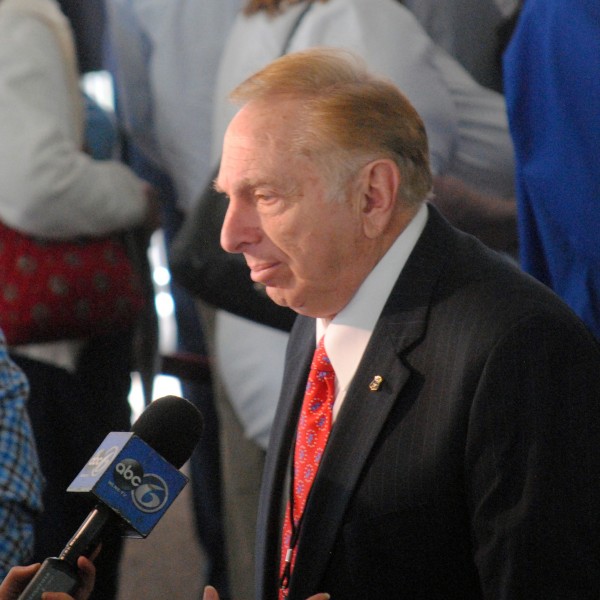 Bernie Sanders’s surprise double-digit win was undeniably the big story of the night, but progressives can find even more good news from the turnout numbers. At 121,923, total Democratic turnout was a whopping 98.6 percent higher than the GOP’s 61,394. To put this in perspective, Obama only won 77.9 percent more votes than Romney.
Bernie Sanders’s surprise double-digit win was undeniably the big story of the night, but progressives can find even more good news from the turnout numbers. At 121,923, total Democratic turnout was a whopping 98.6 percent higher than the GOP’s 61,394. To put this in perspective, Obama only won 77.9 percent more votes than Romney.
To make these results even more stunning, the media’s insistence on over-covering Donald Trump should have juiced the GOP’s numbers, and the media narrative that the Democratic race is over should have depressed the Democratic numbers. But apparently not. The GOP also benefited from a three-way race, which should boost turnout over a two-way like the Democratic contest. Even with these advantages, Democrats solidly outperformed Republicans in turnout.
Unfortunately, some pundits have spun these results as good news for the GOP, pointing to the fact that GOP turnout was up over the 2008 primary. But that analysis conveniently forgets that John McCain had already sown up the Republican nomination by the time Rhode Island voted, while the Obama/Clinton race was very hotly contested.
In the real world, it is difficult to interpret these results as anything but more evidence that Rhode Island is moving to the left. On the right, some Republicans believe that voter anger at the right-wing Democratic establishment’s policies will deliver a red wave in November. Some pundits have begun parroting their talking points. Channel 10 political analyst Wendy Schiller even posited that Donald Trump might win Rhode Island. Fortunately, it looks like Rhode Islanders are too smart to vote for Trump. If these turnout numbers hold, the Republican Party will have a rough November in our state.
]]>
In a succinct statement posted to Facebook, Providence Democratic School Board Chair Nicholas Hemond announced his endorsement of Republican Ohio Governor John Kasich, writing, “John Kasich should be president of the United States.” In an email, Hemond elaborated, saying, “I just appreciate the guy’s measured tone in a race that has been such a circus.” Pointing to a policy of staying out of national races, Hemond clarified that he will not be taking any formal role in Kasich’s campaign.
Frequently portrayed as a member of the establishment wing of the Republican Party, Kasich is known for his fierce advocacy for restricting workers’ rights and defunding Planned Parenthood. Kasich finished second in the New Hampshire Republican primaries.
Hemond is a controversial figure in Providence politics. Working at the Darrow Everett law firm, Hemond has emerged as the go to lobbyist for developers looking for special deals to lower their tax rates. He recently suffered a major defeat when a tax break extension was defeated, due to pointed opposition from Council President Luís Aponte and Majority Leader Kevin Jackson, the leaders of the all-Democratic Providence City Council. While advocating for these subsidies for big developers, Hemond opposed then-Chair Keith Oliveira’s proposal to increase the school budget, instead voting for Mayor Jorge Elorza’s lower proposal. In January, Oliveira resigned in protest, blasting Mayor Jorge Elorza for his education policies and leadership approach. With Elorza’s support, Hemond replaced Oliveira as Chair.
Providence is a strongly Democratic city, backing President Obama over Mitt Romney by a seventy-point margin. Every elected official in Providence is a Democrat. Hemond is also a registered Democrat, and he is thought to harbor ambitions of running for Mayor as a Democrat.
]]> Republican Representatives Patricia Morgan and Dan Reilly have been making a major push to stop the truck tolls in the RhodeWorks proposal. With great vigor, they have branded their efforts as anti-toll, specifically making the argument that the truck tolls are a step on the way to car tolls. Yet despite their stated opposition to tolls, Morgan and Reilly have signed onto a bill that would drastically expand tolls in Rhode Island.
Republican Representatives Patricia Morgan and Dan Reilly have been making a major push to stop the truck tolls in the RhodeWorks proposal. With great vigor, they have branded their efforts as anti-toll, specifically making the argument that the truck tolls are a step on the way to car tolls. Yet despite their stated opposition to tolls, Morgan and Reilly have signed onto a bill that would drastically expand tolls in Rhode Island.
The bill, which is sponsored by conservative Democrat Jared Nunes, creates a special board with the power to privatize any transportation project, allowing private corporations to levy unrestricted tolls on Rhode Island road users. Under the proposal, private corporations could approach the privatization board, and the board could approve privatization with tolls without any required legislative approval. (The bill does provide for entirely optional legislative review.) The language in the legislation is extremely broad, allowing a wide array of potential tolling schemes, including tolls on passenger cars.
As part of the Republican Policy Group’s campaign against RhodeWorks, Morgan and Reilly supported an alternate proposal without tolls. Controversially, their plan did not specify where all the money would come from. At the heart of their proposal was redirecting DMV revenue, money that has already been spoken for in the state budget. (This redirecting revenue tactic is not unique to the GOP. During her campaign, Gina Raimondo proposed paying for school construction by redirecting sales tax revenue that was already being used in the budget.) Despite this, the Republican Policy Group’s anti-toll plan became a major initiative of Morgan, Reilly, and other Republican representatives.
Privatizing roads and bridges to let private corporations charge tolls is a popular policy idea among Republicans across the country. In Indiana, for instance, Republican Governor Mitch Daniels successfully championed a plan to sell off the right to toll Interstate 90 to a foreign corporation, saying, “You’re either for this bill, or you’re against our future.” (Later, the plan went bankrupt.)
]]>
PolitiFactRI has a history of sloppy reporting and conservative bias that has generated national attention. But a piece on whether developers deserve huge cash handouts broke new ground.
It centers around David Sweetser, the principal owner of the Superman Building. Controversially, Sweetser has refused to renovate the building or bring in tenants until the city and state agree to pay him tens of millions of dollars in taxpayer money—considerably more than the purchase price.
When Ed Fitzpatrick at the Providence Journal reported on the Superman Building, Sweetser gave him a classic defense. As Fitzpatrick wrote: “Sweetser, who lives in Wellesley, Massachusetts, said the reality is that Boston is just 60 minutes away and it’s offering subsidies to developers who can charge higher rent than you can get in Providence, while construction costs are more or less equal.” PolitiFactRI rated Sweetser’s defense true. This is an important claim to unpack because it’s one of the most common arguments big Rhode Island developers use in their quest for taxpayer cash. It’s also extremely misleading.
To begin with, what makes Boston real estate so expensive is not the cost of construction. It’s the cost of land. The whole point of this developer talking point is to imply that overall costs are no higher in Boston–something that is definitely not true.
PolitiFactRI does not address this point. Instead, they zero in on whether construction costs are higher. So how does PolitiFactRI seek to answer this question? Do they consult some unbiased labor cost index? No, they just ask the Gilbane Corporation—one of the biggest developers in Rhode Island.
Interestingly, Gilbane does not say construction costs are identical. They say there is, in fact, a “slight overall difference.” But they also say, “When it comes to larger more complex projects costs are roughly the same.” If Gilbane shared any hard numbers, PolitiFactRI neglected to print them.
Now, Massachusetts is a considerably wealthier state, with stronger unions and a slightly higher minimum wage. It would be odd if labor costs were not slightly higher in Boston. But just how big that difference is is an interesting question. Unfortunately, PolitiFactRI does not give us a number.
Finally, there is the question of subsidies in Boston. PolitiFactRI asks Nicholas Martin, the spokesman for the Boston Redevelopment Agency. He says, “I would not hesitate to say that the majority of construction that’s going on in the city of Boston is not subsidized,” although he does clarify that some big projects do get subsidies.
Boston certainly does offer some absurd subsidies, but the situation today is nothing like Providence, where pretty much every big project gets a special tax break. Boston does lots of developments without subsidies, and they even make Fenway stadium pay taxes.
Under liberal Governor Michael Dukakis, the Massachusetts economy went through a huge boom called the , and the state now has quite a strong economy. That’s why the state has a strong housing market. Like Rhode Island today, Massachusetts used to struggle with conservative Democrats who opposed good policy. Ronald Reagan called Governor Edward King, Dukakis’s rival, his “favorite Democrat,” and King formally became a Republican after Dukakis beat him in the 1982 primary. Today, the Massachusetts legislature is filled with solid real Democrats like Senate President Stan Rosenberg. And the state is thriving, especially when compared to Rhode Island.
If Rhode Island wants to learn a lesson from Massachusetts, we should try breaking the machine and electing real Democrats.
]]>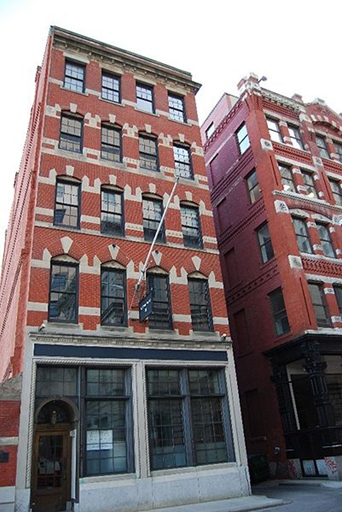 This Thursday at 6pm, the Finance Committee of the Providence City Council is meeting to consider a generous tax break proposed for the Custom House downtown office building.
This Thursday at 6pm, the Finance Committee of the Providence City Council is meeting to consider a generous tax break proposed for the Custom House downtown office building.
Currently, the Custom House is downtown office space, and the developers want to convert the upper floors to apartments. And they want public money to do it.
The deal the developers are pushing for is structured as a 12-year tax stabilization. For the first three years, there would be no new taxes, and the new taxes would ramp up over the next nine years. Make no mistake, this is a special deal for a specially connected developer. These deals aren’t being made available to ordinary small-time developers, who can’t afford the same network of well-connected lobbyists, lawyers, and tax credit brokers. If you expand your house or renovate a dilapidated triple-decker, you don’t get your taxes stabilized.
This special tax break is crucially important because the city is currently writing a standardized policy on special tax breaks for big developers. During the campaign, Mayor Jorge Elorza was critical of the abuses of the tax-stabilization agreement program. Newly elected Council President Luís Aponte has been even more vocally critical of abusive and unfair special tax breaks for developers. According to multiple City Hall sources, the new standardized policy could severely restrict some abuses, making these special breaks much shorter than the twelve years being proposed for the Custom House.
That’s why stopping this deal is so vitally important. If the city approves an excessively long twelve-year stabilization, it will set the bar abysmally low for the standardized policy. Valuable revenue that could go to underfunded priorities like schools, snow plowing, and tax relief will be wasted on corporate special interests.
There is serious skepticism on the Council over such an overly generous deal. Its future is very much up in the air.
That’s why it will be so important to come to this hearing at 6pm in the Council chambers. We can stop this unfair deal.
]]>To understand what I’m talking about, we need a little background into the theory of the 2008 economic crisis that’s become broadly accepted, especially among economists affiliated with the Democratic Party.* (Republican economists have some alternate theories, most of which I find pretty kooky.) The basic story is that 2008 was an old-school private sector debt crisis. Private sector debt had risen much higher than public sector debt. (The exact figure depends a lot on how you count.) Most of the debt had piled up in the business sector, especially the banking sector, but there was still an awful lot of debt in the hands of ordinary American families, mostly in the form of mortgages. It was a lot of debt.
Since World War 2, one of the main drivers of aggregate demand in the economy had been an accelerating accumulation of private sector debt. In the 1908s, as public policy grew more conservative, this debt accumulation began to accelerate even faster, supported by an expanding housing bubble.
Unfortunately, the private sector can’t accumulate infinite amounts of debt forever.
When the housing bubble partially popped, households realized their debt loads were too high, and they began paying them down. Instead of spending that money on consumer goods, they paid down debt. This resulted in a massive crash in aggregate demand and a big economic crisis. To make things worse, the federal government hadn’t been providing enough stimulus to support growth, and the economy had been relying on private sector debt to prop it up. So the recovery was pretty slow as the private sector continued to pay down its debt without much help from the government. Now that the private sector has started going into debt again, we’re seeing growth pick up a bit.
Anyway, this is important because it explains why a lot of states had particularly bad experiences in the crash. States like Nevada and California (and to a lesser extent Florida and Arizona) had abnormally high debt loads, and their residents paid down an abnormally large amount of debt. They wound up with abnormally bad crashes.
The textbook case is Nevada. In Nevada, households reduced debt by the most of any state, with the average resident paying down $26,300 from the end of 2008 to the end of 2013. For comparison, the US average was $6,100. Naturally, Nevada’s crash was especially severe, arguably the worst in the country. Now that Nevada’s household debt load has come down to about the US average, and Nevada residents have stopped paying down debt abnormally fast, the state economy is doing a lot better.
Private sector debt, then, can have a big effect on state economies. So I’d always wondered: could Rhode Island have had an abnormally bad crash not just because of right-wing policies but also because of an abnormally high private sector debt load?
When a recent Boston Fed paper mentioned state-level debt statistics, I wrote to the author, Mary Burke, and she helpfully pointed me to a dataset maintained by the New York Fed. Apparently, the New York Fed has been keeping statistics on state-by-state household debt, with the full data series starting in 2004 (before then, they didn’t track student loan debt). Now, they don’t necessarily count all household debt, but they do count mortgage, auto, credit card, and student loan debt, which together cover the vast majority of household debt.
For the purposes of this piece, I’m going to treat the sum of those four sources as total household debt, which isn’t 100% correct but comes close. There’s one other niggle about this dataset. It only counts state by state statistics in the forth quarter of each year, so when I cite years, I’m not talking about a yearly average. The 2014 forth quarter numbers aren’t out yet, so the latest data come from more than a year ago and don’t really capture the recent return to household debt accumulation.
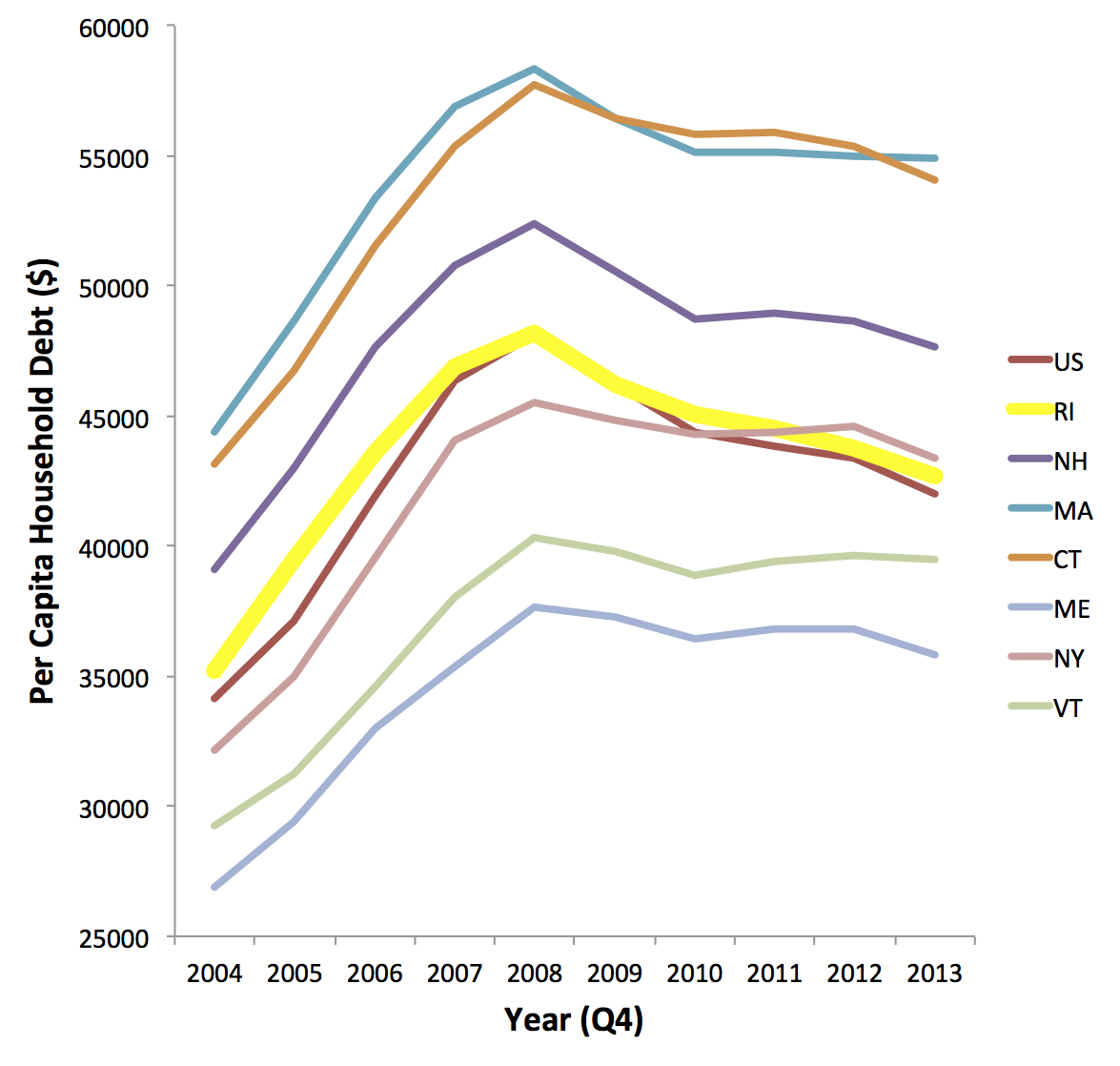 So does Rhode Island have an unusually high debt load? And did we have to pay down an unusually large amount? No and no. In fact, Rhode Island’s peak debt of $48,200 was virtually identical to the national average of 48,100. We reduced debt by only $5,500, which is a little less than the $6,100 national average. So debt cannot explain our abnormally bad crash.
So does Rhode Island have an unusually high debt load? And did we have to pay down an unusually large amount? No and no. In fact, Rhode Island’s peak debt of $48,200 was virtually identical to the national average of 48,100. We reduced debt by only $5,500, which is a little less than the $6,100 national average. So debt cannot explain our abnormally bad crash.
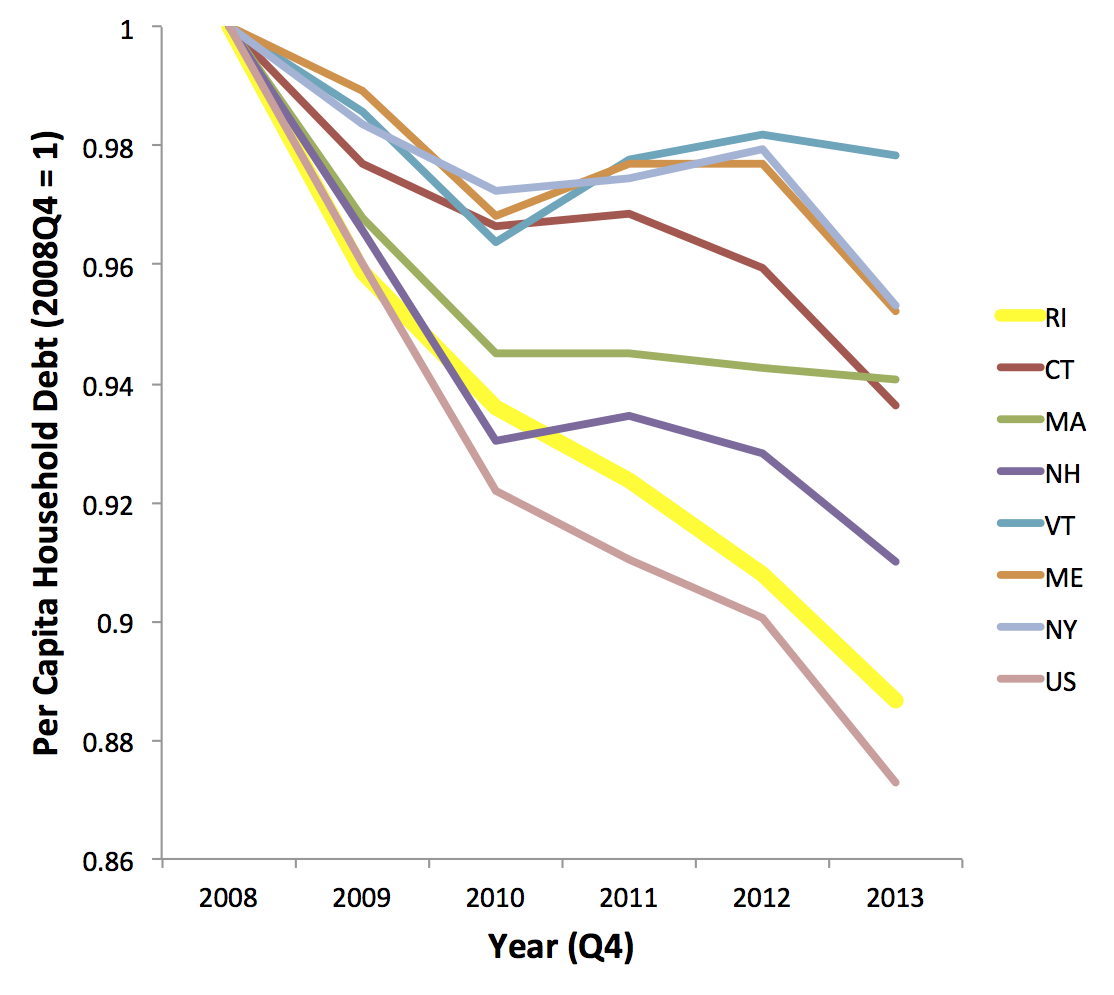
What debt can partially explain is the relatively good performances of our neighboring states. Massachusetts and Connecticut have quite high debt loads, but that at least partially reflects their high per capita income. And relative to the 2008 peak debt, the other states in our region reduced their debt loads a lot less than Rhode Island. This helps explain why our region is doing better than the country as a whole. And it helps explain why we lag behind our neighbors.
But it does not explain why we lag the nation. For that, we really need another explanation. And the right-wing economic policies of the conservative Murphy machine fit the data best.
*The extent to which this theory is fully accepted among Democratic economists is a bit complex. Although it started in a school of thought somewhat to the left of the mainstream, most prominent Democratic macroeconomists have adopted some version of it. The basis of this theory was developed to explain the Great Depression by Hyman Minsky, probably the most important founder of the post-Keynesian school of macroeconomic thought. (Minsky has a bit of a Rhode Island connection. He taught at Brown for a while, and he married a Rhode Islander.) It was later fleshed out by other post-Keynesians, who predicted that the ever increasing private debt would lead to a crash. Broadly speaking, the post-Keynesian movement represents the ideological space to the left of the neo-Keynesians and to the right of the socialists, Marxists, and radicals. Although it’s fully contained within the free market tradition, it tends to generate a lot of scorn from neoclassical economists. Since the crash, however, post-Keynesians have been gaining prominence within the Democratic Party’s policy universe. For instance, prominent post-Keynesian economist Stephanie Kelton was recently appointed the chief Democratic economist for the Senate Budget Committee. Some post-Keynesian ideas remain the subject of fierce debate, but the private sector debt theory of the 2008 collapse has been adopted by more mainstream economists, including Gauti Eggertsson, who is probably the most famous macroeconomist in Rhode Island.
]]>Before the hike, the car tax had a $6000 exemption and a rate of 7.678%. In addition to lowering the exemption to $1000, the city cut the rate to 6%. The net result was a lower effective tax rate on cars worth more than roughly $24,000 and a higher rate on cheaper cars. To his great credit, Solomon now says that this tax cut for expensive cars was unintentional and a mistake. Here is what he told the Progressive Democrats at our mayoral forum:
“Because the exemption was taken away, we thought it was easier for people with a $5000 car to pay $60 per thousand than $77 per thousand.* In hindsight, we probably would have been better off raising the exemption level. So we kind of did it backwards…Ultimately, what we had in mind was taking care of people who had cars under five or six thousand. We thought, by lowering the rate from $77 to $60,* that that would save them some money.”
When I first met Mayor-elect Jorge Elorza, months before he announced his campaign, he told me how concerned he was about how the Taveras-Solomon car tax hike hurts working families. It is a message he repeated time and time again on the campaign trail. But the City of Providence does not have very much money, so the price of a repeal matters.
That is why the fiscal analysis the Providence City Council quietly released right before Christmas matters so much. It pegged the price of a repeal at $20.5 million. As policymakers struggling with the next budget try to squeeze in some sort of repeal, that is the cold, inflexible number they will be facing. But it should not be.
When I first saw that figure, I was surprised, since the car tax hike had only netted the city $14.2 million in the first place. Digging deeper into the report, the reason for the discrepancy became clear. The $20.5 million figure assumed the city was going to maintain the lower rate, which led to the tax break for expensive cars.
I wrote to the author of the report, Nick Freeman, and he happily provided me the cost of a clean repeal of the car tax changes—$15.15 million.
So when budget writers try to find the cash to return to the old car tax system and provide some relief for Providence’s working families, that is the number they should be aiming for, not $20.5 million. It makes a tough lift quite a bit more realistic.
And if they cannot find the money, they should provide some quick relief by repealing the rate cut to fund an increase in the exemption. It would be free. It would be fair. And it would ease the financial squeeze so many in our city suffer under.
*Confusingly, car tax rates are typically reported as dollars per thousand, so when people talk about a $60 rate, they mean 6%.
]]>